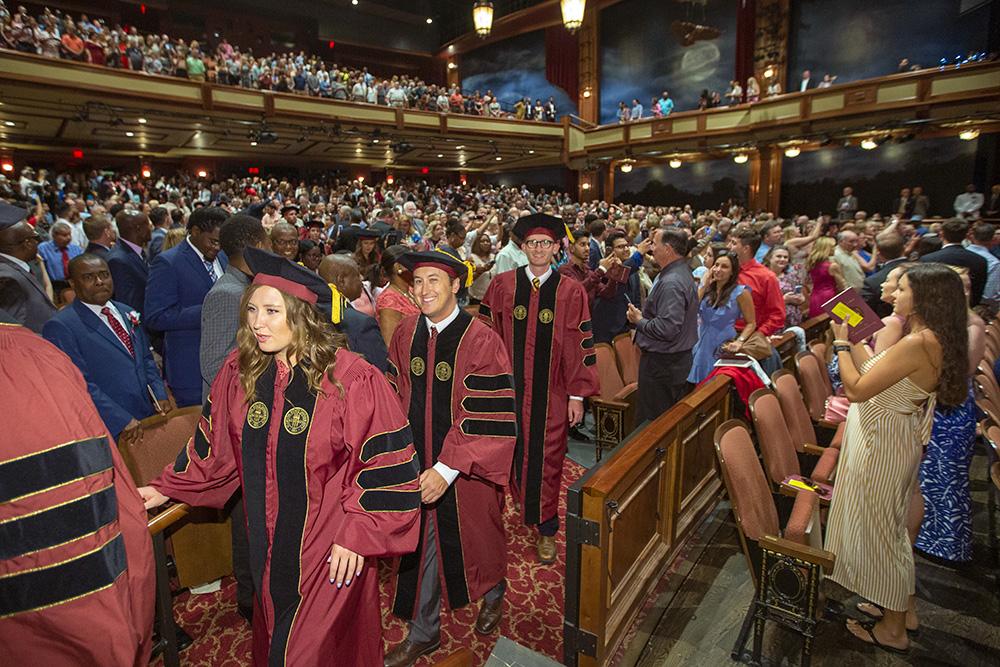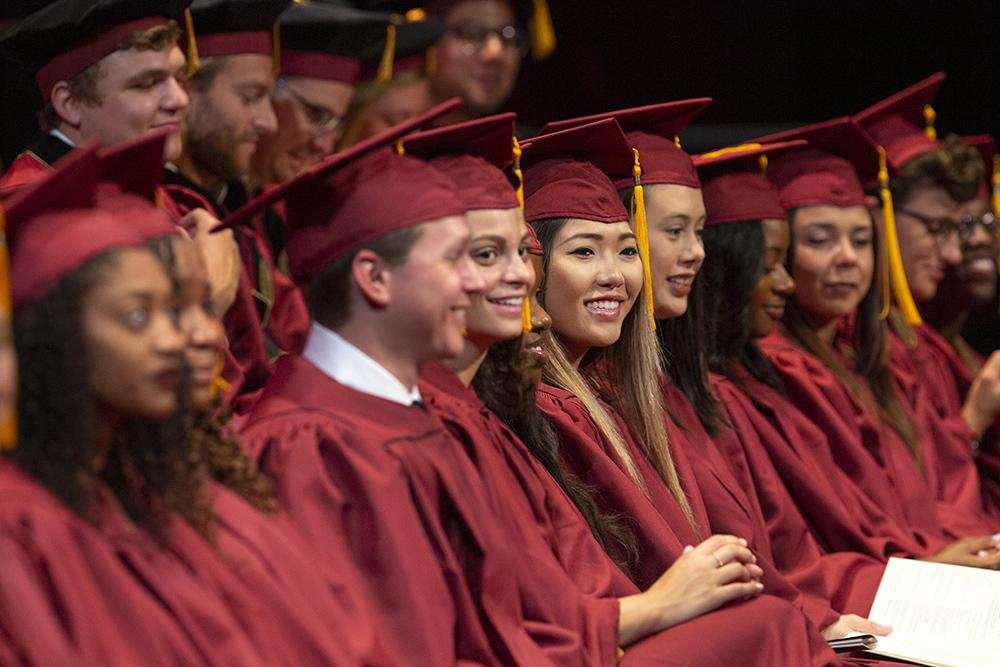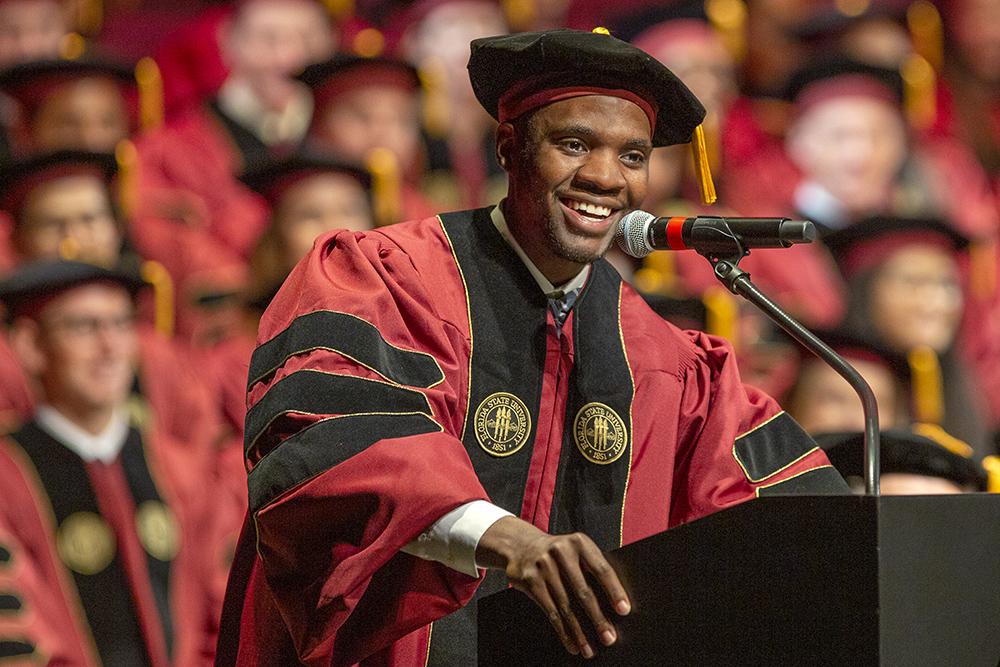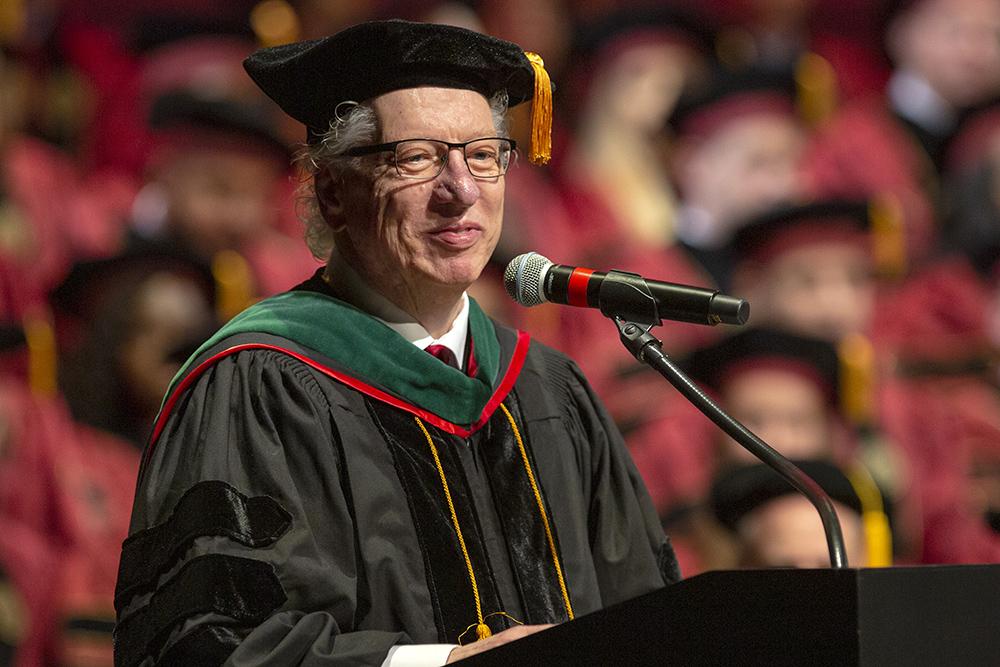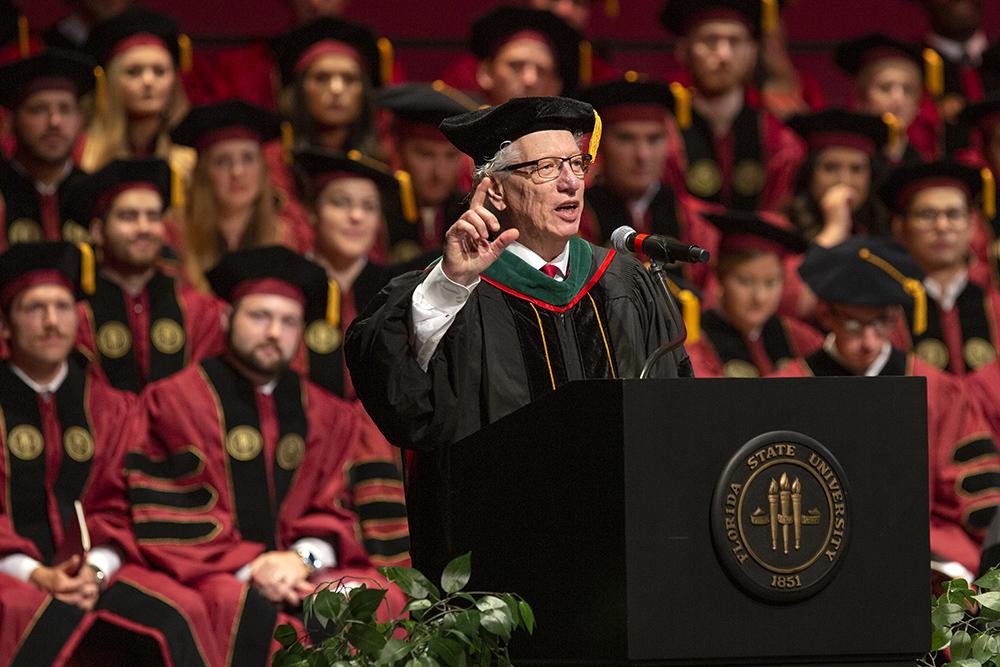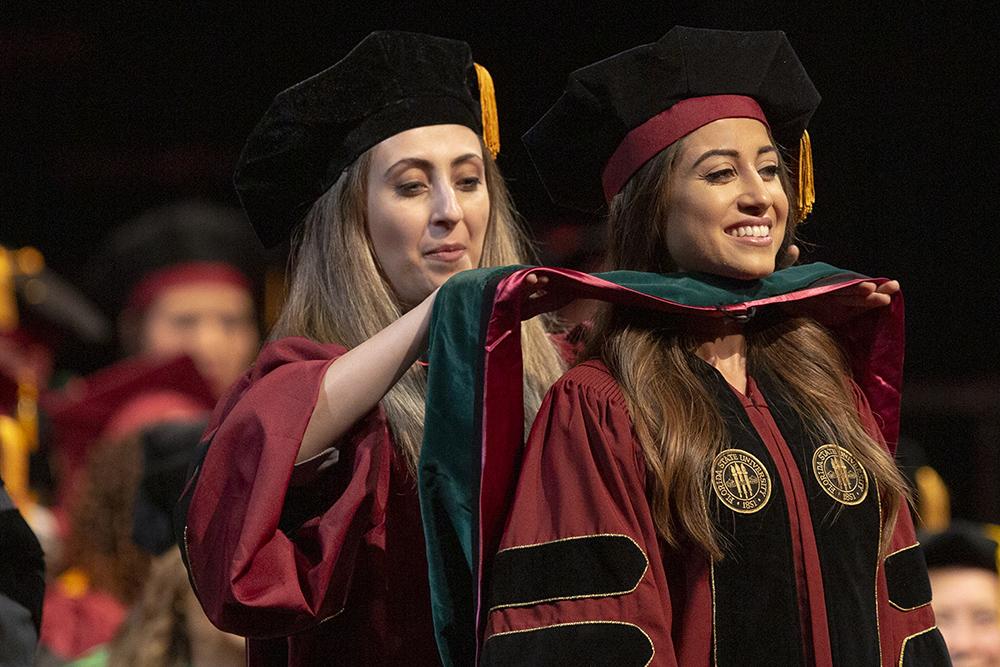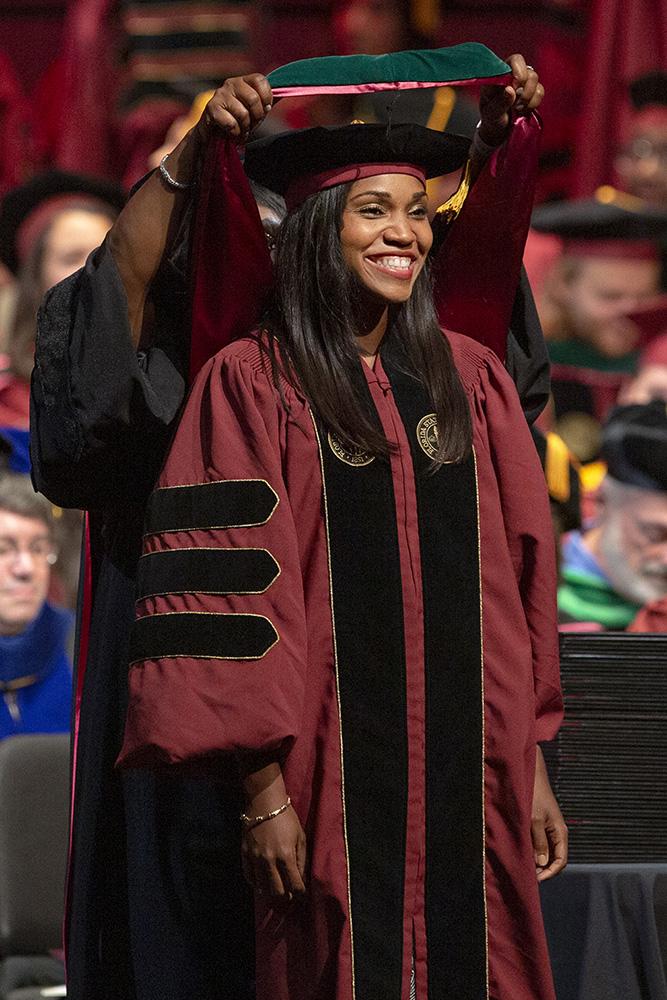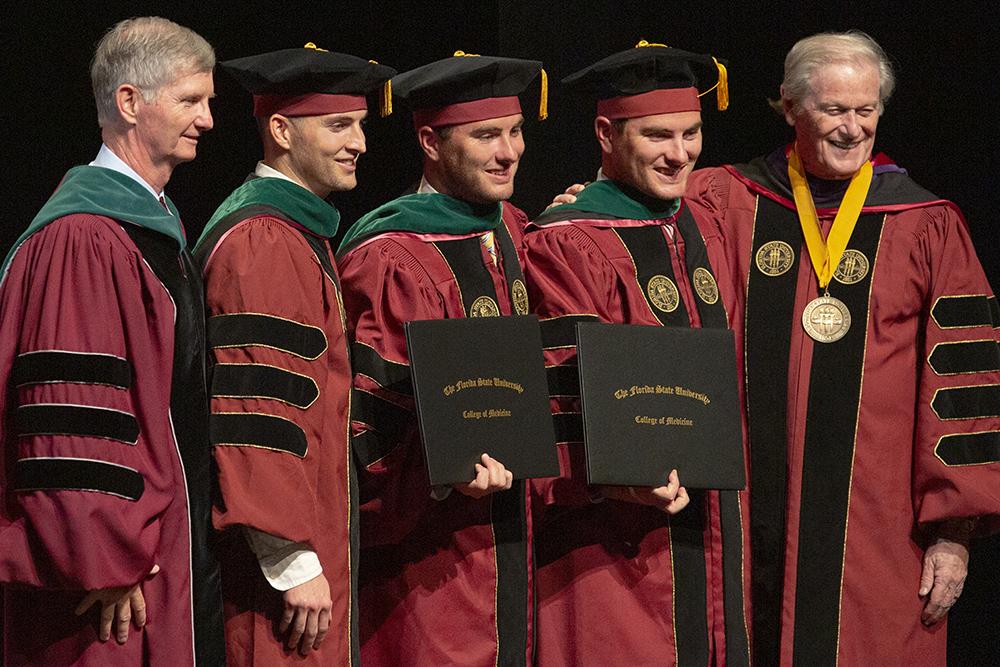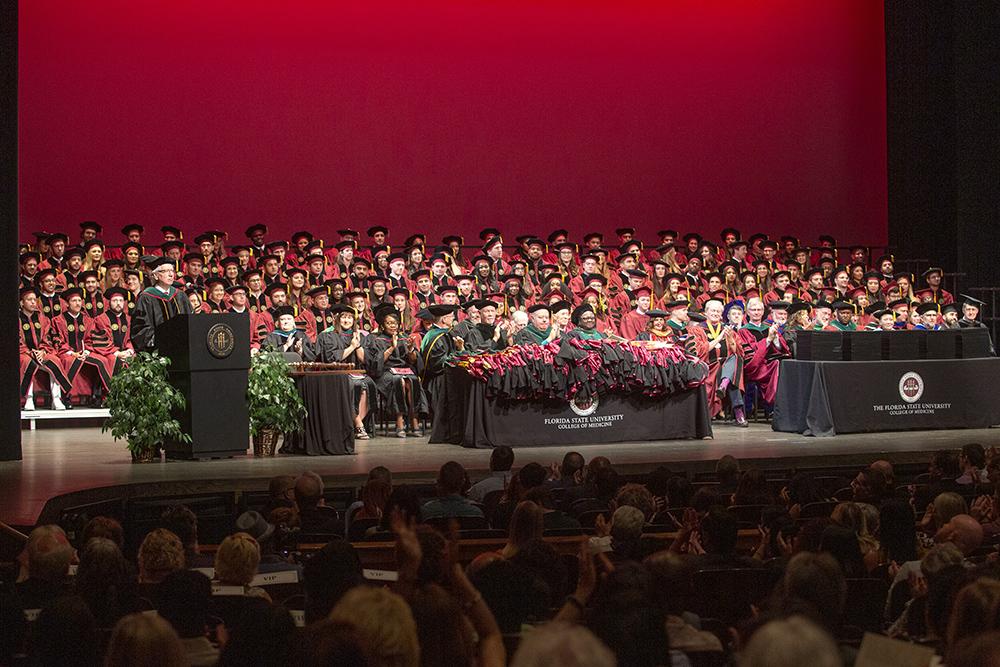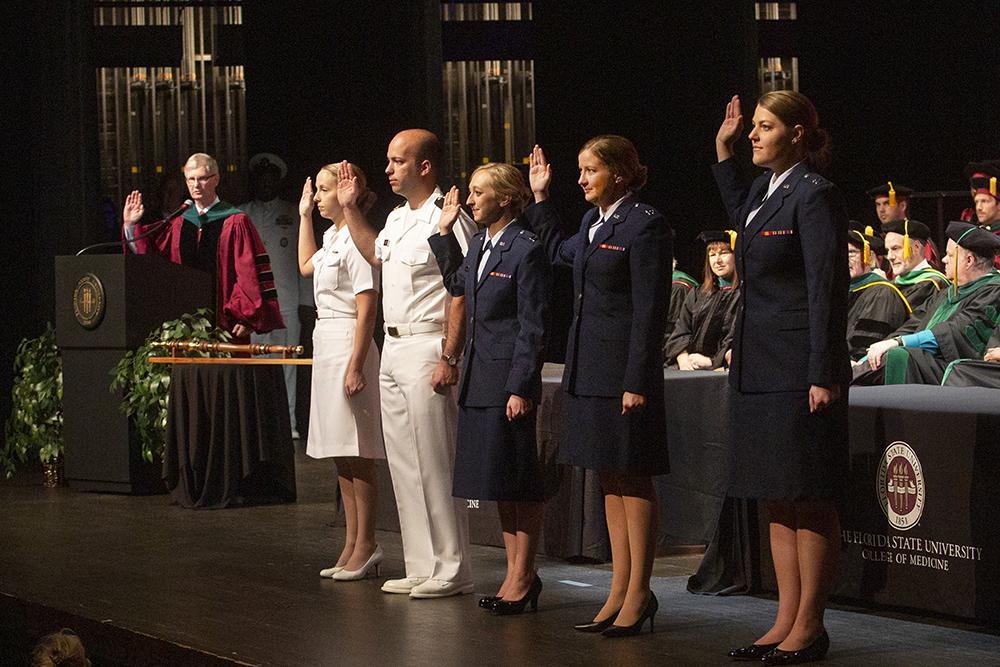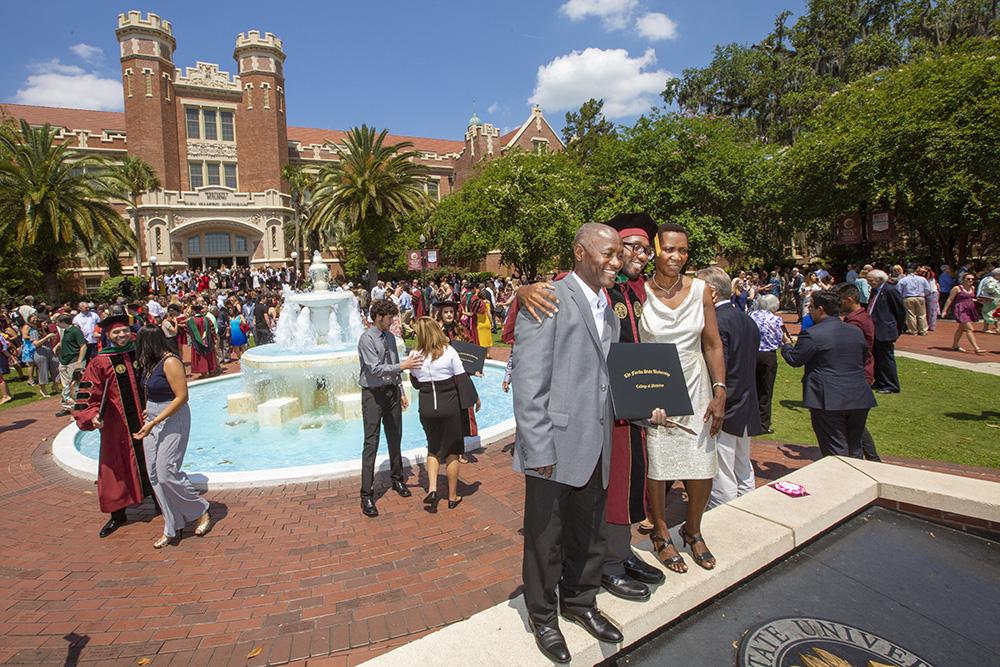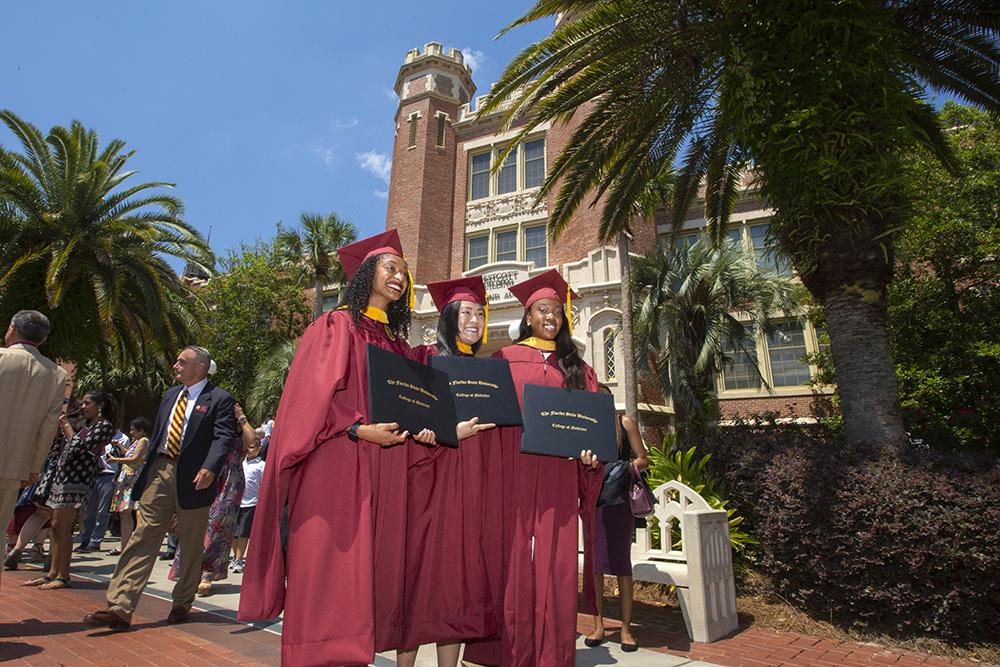'First, I will do no harm': Class of 2019 students become M.D.s
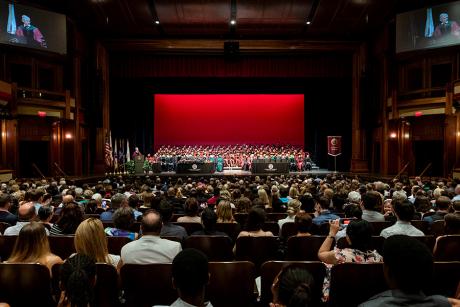
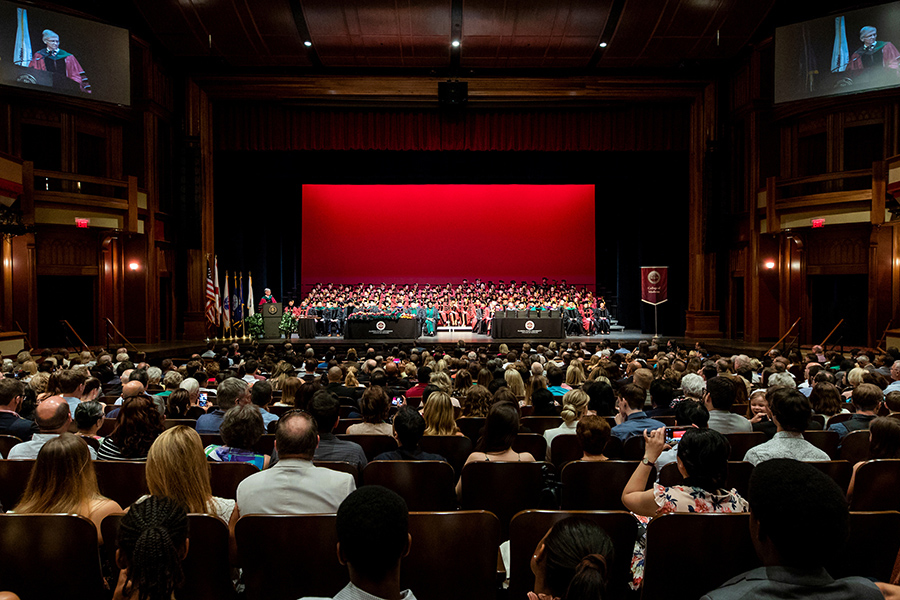
They arrived as students and departed as doctors. In between were raucous cheers, air-horn blasts, babies’ cries and audible sighs as, one by one, the 113 graduates of the FSU College of Medicine’s Class of 2019 crossed the stage and grabbed the diploma of their dreams.
This was the medical school’s 15th graduating class, and Ruby Diamond Concert Hall was packed.
Also during the two-hour celebration, five grads received their military promotions. Seven grads were “hooded” by relatives – several of whom were College of Medicine alumni. Plus the 13 members of this year’s Bridge class received their master’s degrees.
FSU President John Thrasher was there to shake every hand. Commencement speaker Michael Muszynski offered the graduates an abundance of advice, including this final recommendation: “When you awake each morning, ask yourself: What good can I do today? And when the hard day’s work has ended, and you lay your head to rest, ask yourself: What good did I do today?”
Dean John P. Fogarty put this class’s era in perspective. During their time here, the College of Medicine established a new curriculum, launched a PA program, developed new residency programs throughout the state, established FSU SeniorHealth and FSU PrimaryHealth, and expanded its SSTRIDE pipeline programs in Immokalee and Sarasota.
Along the way, Fogarty said, the Class of 2019 made its own mark.
“You studied here during turbulent times in our nation’s history,” he said, “and instead of protesting, you focused on bringing the community together by creating Racism Awareness Week, an amazing collaboration with our local community…. Your class also developed and founded the HIV/AIDS vigils at the College of Medicine in collaboration with FAMU, Bond Community Health Center and Big Bend Cares…. Many of you also jumped at the chance to help Hurricane Michael victims in Marianna, Panama City and surrounding communities.”
These students also did everything they could during their med-school years to honor the memory of classmate Matt Wittman, who died in 2017. Friday afternoon, a commemorative plaque was unveiled in a shady spot outside the College of Medicine. Saturday morning, Wittman’s white coat – usually displayed in the Clinical Learning Center, his favorite place to be – was brought onstage for a final tribute before these new doctors depart for their residency programs.
Muszynski, retiring dean of the Orlando Regional Campus, has been part of the College of Medicine since 2004. After regaling the grads with stories of his mentors and his challenges, such as the hostile reception that children with HIV/AIDS had gotten early in his career in pediatric infectious diseases, he concluded his message to the graduates with these and other questions:
“Will you reflect on your journeys leading to this moment? Can you do the thankless work of asking ‘Why?’ and ‘Why not?’ … Will you dedicate yourself to doing good deeds? Will you dare to make waves? Will you dare to light candles in the darkness?” (See his entire speech below.)
Class President Bryno Gay (“I am only here today by the grace of God and a poor boy’s dream for a better tomorrow”) urged his classmates to reflect on their arduous journey.
“It’s easy to forget why we even wanted to pursue this profession when we miss birthdays, holiday celebrations and even our own anniversaries,” he said. “When we work all night and sleep seems more like a luxury than a necessity. When patients die, even though we’ve done everything in our power to try and save ’em.”
Yet he kept it hopeful with this refrain: “Take a look around … We’re here … we’ve made it.” (See his entire speech below.)
As always, President Thrasher and everyone else in attendance seemed to believe that this was the absolute best way to spend the third Saturday in May.
The graduates crossed the stage in six groups, representing the six regional campuses where they had spent their third and fourth years: Daytona Beach, Fort Pierce, Orlando, Pensacola, Sarasota and Tallahassee. Each name was called out, preceded by “Doctor.” One by one, the dean from their campus (or an M.D. family member) stood behind them and brought the hood down over their head and onto their shoulders. Then they received their diploma and posed for a photo with Thrasher and Fogarty.
The day before graduation, 41 students were honored at an awards assembly in the Durell Peaden Auditorium. Brittany Tanner led the class with five recognitions, including the equivalent of the MVP award. Stephanie Hurwitz (the College of Medicine’s first M.D./Ph.D. student), Meghan Lewis and Steven Pifer were tied with four recognitions apiece. (See awards summary below.)
Also recognized in the graduation program were four College of Medicine graduate students who earned a Ph.D. in biomedical sciences during the 2018-2019 academic year: Michael Bokros, Ryan Higgins, Lindsay Sailer (neuroscience-biomedical sciences) and Alyssa Rolfe.
Soon, the new M.D.s will be heading off for the residency programs where they’ll spend the next three or more years. Meanwhile, in 10 days the newly graduated Bridge students will be back in school – this time as members of the College of Medicine’s Class of 2023.
And for those keeping score … the med school now has 1,368 alumni.
CLASS OF 2019 HONOREES
COLLEGE OF MEDICINE AWARDS
J. Ocie Harris Outstanding Student Award: Brittany Tanner
Myra M. Hurt Leadership in Medicine Award: Meghan Lewis
Mission Award: Tucker Retherford
Nobles/Brown Altruism in Medicine Award: Ashley Kreher
Student Research Award: Stephanie Hurwitz
Robin McDougall Access to Care Award: Stefano Leitner
Linda Stine Interprofessional Leadership Award: Andrew Kropp
SPECIALTY AWARDS
ACEP Medical Student Professionalism and Service Award: Mark Kastner
Excellence in Emergency Medicine Award: Seth Fielding
Outstanding Graduate in Family Medicine: Meghan Lewis and Steven Pifer
Florida Geriatrics Society Award for Outstanding Student: Tucker Retherford
Internal Medicine Award: Nadia Akhiyat
American Congress of Obstetricians & Gynecologists District XII Outstanding Medical Student Achievement Award: Emily Deibert Cisneros and Sarah Schaet
Merritt Ryals Clements, M.D., Award for Excellence in Obstetrics and Gynecology: Karisa Brown and Oluremi Omotayo
Stephen M. Nobles, M.D., Pathogenesis Award: Stephanie Hurwitz
Excellence in Pediatrics Award: Bianca Alvarez
AACAP Psychiatry Award: Anna F. Ehrhardt
Edward L. Bradley, M.D., Excellence in General Surgery Award: Clayton Rooks
Robert D. Snyder, M.D., Award for Outstanding Student in General Surgery with a Focus on Breast Cancer: Daniel Farinas Lugo
Ben J. Kirbo, M.D., Outstanding Student in Breast Cancer Reconstructive Surgery Award: Lee Weber
American Medical Women’s Association Glasgow-Rubin Achievement Citation (women in top 10% of graduating class): Amy Amornmarn, Andrea Comiskey, Emily Deibert Cisneros, Anna Fulghum Ehrhardt, Stephanie Hurwitz, Alexis Kimmel, Brittany Tanner
American Medical Women’s Association Outstanding Graduate: Sara Ardila
REGIONAL CAMPUS DEANS’ AWARDS
(For the most outstanding student at each College of Medicine regional campus)
Daytona Beach: Samuel Cook, Steven Pifer
Fort Pierce: Alexandra Lackey
Orlando: Brittany Tanner
Pensacola: Clayton Rooks
Sarasota: Kevin Hill
Tallahassee: Meghan Lewis
HONOR SOCIETIES
Alpha Omega Alpha Honor Medical Society inductees (the only national honor medical society): Nicolas Aguila, Hana Ahmed, Nadia Akhiyat, David Aung-Din, Michael Babcock, Brandon Cardon, Andrea Comiskey, Samuel Cook, Emily Deibert Cisneros, Ryan Diaz, Anna Fulghum Ehrhardt, Seth Fielding, Nickolas Garson, Kevin Hill, Stephanie Hurwitz, Alexis Kimmel, Ishaan Madhok, Steven Pifer, Tucker Retherford, Brittany Tanner
Gold Humanism Honor Society inductees (“excellence in clinical care, leadership, compassion, and dedication to service”): Nadia Akhiyat, Sara Ardila, Michael Babcock, Karisa Brown, Shelbi Brown, Alan Chan, Samuel Cook, Eric Crespo, Zedeena Fisher, Bryno Gay, Mark Kastner, Meghan Lewis, Steven Pifer, Clayton Rooks, Brittany Tanner, Timothy Walsh
MILITARY PINNING CEREMONY
Promotion in rank for students in the armed services:
Air Force – Capt. Meghan Lewis, Capt. Olivia Tighe
Navy – Lt. Alexandra Johnston, Lt. Michael Rizzo, Lt. Sarah Schaet,
SUMMARY OF CLASS OF 2019 STUDENT HONOREES (in alphabetical order)
Nicolas Aguila: Alpha Omega Alpha Honor Medical Society
Hana Ahmed: Alpha Omega Alpha Honor Medical Society
Nadia Akhiyat: Internal Medicine Award, Alpha Omega Alpha Honor Medical Society, Gold Humanism Honor Society
Bianca Alvarez: Excellence in Pediatrics Award
Amy Amornmarn: American Medical Women’s Association Glasgow-Rubin Achievement Citation (women in top 10 percent of graduating class)
David Aung-Din: Alpha Omega Alpha Honor Medical Society
Sara Ardila: American Medical Women’s Association Outstanding Graduate, Gold Humanism Honor Society
Michael Babcock: Alpha Omega Alpha Honor Medical Society, Gold Humanism Honor Society
Karisa Brown: Merritt Ryals Clements, M.D., Award for Excellence in Obstetrics and Gynecology, Gold Humanism Honor Society
Shelbi Brown: Gold Humanism Honor Society
Brandon Cardon: Alpha Omega Alpha Honor Medical Society
Alan Chan: Gold Humanism Honor Society
Andrea Comiskey: American Medical Women’s Association Glasgow-Rubin Achievement Citation (women in top 10 percent of graduating class), Alpha Omega Alpha Honor Medical Society
Samuel Cook: Regional Campus Dean’s Award-Daytona Beach, Alpha Omega Alpha Honor Medical Society, Gold Humanism Honor Society
Eric Crespo: Gold Humanism Honor Society
Emily Deibert Cisneros: American Congress of Obstetricians & Gynecologists District XII Outstanding Medical Student Achievement Award, American Medical Women’s Association Glasgow-Rubin Achievement Citation (women in top 10 percent of graduating class), Alpha Omega Alpha Honor Medical Society
Ryan Diaz: Alpha Omega Alpha Honor Medical Society
Anna Fulghum Ehrhardt: AACAP Psychiatry Award, American Medical Women’s Association Glasgow-Rubin Achievement Citation (women in top 10 percent of graduating class), Alpha Omega Alpha Honor Medical Society
Daniel Farinas Lugo: The Robert D. Snyder, M.D., Award for Outstanding Student in General Surgery with a Focus on Breast Cancer
Seth Fielding: Excellence in Emergency Medicine Award, Alpha Omega Alpha Honor Medical Society
Zedeena Fisher: Gold Humanism Honor Society
Nickolas Garson: Alpha Omega Alpha Honor Medical Society
Bryno Gay: Gold Humanism Honor Society
Kevin Hill: Regional Campus Dean’s Award-Sarasota, Alpha Omega Alpha Honor Medical Society
Stephanie Hurwitz: Student Research Award, Stephen M. Nobles, M.D., Pathogenesis Award, American Medical Women’s Association Glasgow-Rubin Achievement Citation (women in top 10 percent of graduating class), Alpha Omega Alpha Honor Medical Society
Mark Kastner: ACEP Medical Student Professionalism and Service Award, Gold Humanism Honor Society
Alexis Kimmel: American Medical Women’s Association Glasgow-Rubin Achievement Citation (women in top 10 percent of graduating class), Alpha Omega Alpha Honor Medical Society
Ashley Kreher: Nobles/Brown Altruism in Medicine Award,
Andrew Kropp: Linda Stine Interprofessional Leadership Award
Alexandra Lackey: Regional Campus Dean’s Award-Fort Pierce
Stefano Leitner: Robin McDougall Access to Care Award
Meghan Lewis: Myra M. Hurt Leadership in Medicine Award, Regional Campus Dean’s Award-Tallahassee, Outstanding Graduate in Family Medicine, Gold Humanism Honor Society
Ishaan Madhok: Alpha Omega Alpha Honor Medical Society
Oluremi Omotayo: Merritt Ryals Clements, M.D., Award for Excellence in Obstetrics and Gynecology
Steven Pifer: Regional Campus Dean’s Award-Daytona Beach, Outstanding Graduate in Family Medicine, Alpha Omega Alpha Honor Medical Society, Gold Humanism Honor Society
Tucker Retherford: Mission Award, Florida Geriatrics Society Award for Outstanding Student, Alpha Omega Alpha Honor Medical Society
Clayton Rooks: Regional Campus Dean’s Award-Pensacola, The Edward L. Bradley, M.D., Excellence in General Surgery Award, Gold Humanism Honor Society
Sarah Schaet: American Congress of Obstetricians & Gynecologists District XII Outstanding Medical Student Achievement Award
Brittany Tanner: J. Ocie Harris Outstanding Student Award, Regional Campus Dean’s Award-Orlando, American Medical Women’s Association Glasgow-Rubin Achievement Citation (women in top 10% of graduating class), Alpha Omega Alpha Honor Medical Society, Gold Humanism Honor Society
Timothy Walsh: Gold Humanism Honor Society
Lee Weber: The Ben J. Kirbo, M.D., Outstanding Student in Breast Cancer Reconstructive Surgery Award
GRADUATION SPEECHES
COMMENCEMENT ADDRESS
By Michael Muszynski, M.D., Orlando Regional Campus dean
Now, deans should not play favorites, and I am a dean – at for another hour and a half. But since I am retiring … I can take liberties. So here goes. In my 15 years at FSU, I haven’t seen a class quite like yours. Sure, great classes came before, but 2019 is a stunning combination of scholarship and some of the finest individuals I have come to know. Your class is my favorite. To those of you on this stage who serve on the admissions committee, whatever you’re doing, keep it up!
So, ladies and gentlemen, let’s give this class its due. Let’s raise the roof of this fine auditorium for the Class of 2019!!
When I was named commencement speaker, I wondered what I might say that would be meaningful to everyone. As many know, I’m not lost for words. But what words for this moment? What conceivably sage advice might I have? What speech of mine would not become a bestselling over-the-counter sleep aid – rivaling Nyquil? I searched for answers by reflecting – and the answer came to me the next morning, in the shower – where, for some reason that still baffles me, I do my best thinking.
Reflection is key. It is everything to understanding oneself.
In giving advice on how you might reflect, I thought my personal experiences could serve as examples, not that they are monumental or laudable, but because I know them best.
I asked myself: “When I decided to become a physician, what were my reasons back then?”
“Why am I where I am today?”
My recollections are fuzzy. They were long ago. Relatives say I declared at 9 years old that I wished to be a pediatrician – around the time I discovered the wonders of biological science – when I dissected a fish that died in my aquarium – with a library book on fish anatomy in hand. I was a hopeless nerd from the start.
But the actual deciding influence was my first medical mentor, Dr Brian Hutt. No… he was not my professor in med school or residency, or fellowship, or college, or high school. His name is unfamiliar to anyone in medicine. He was my mentor since birth and my hero in medicine.
He was my pediatrician.
I was born with complete heart block, a consequence of cross-reacting antibodies lurking in my mother’s bloodstream that crossed her placenta to visit me and attach themselves to the electrical wiring of my heart with nefarious intent. Dr Hutt and the specialists in 1952 informed my parents that I would not survive infancy—babies with complete heart block—what was known back then—had an ominous prognosis. I obviously made it through infancy, (although my lovely and sagacious wife will tell you that I am still quite a big baby). Medical advancement later showed many children do well into adulthood. I made it with my own wiring until 1995 when I got my first pacemaker.
In childhood, Dr Hutt was with me through thick and thin. For a kid who had to go through life with the burden of wondering when heart failure or sudden death would strike, Dr Hutt was the ultimate prescription. At office visits, he listened to me – FIRST! Before he got the story from my mom. A tactic I used later in my own practice to connect with children and families. Dr Hutt counseled me in ways that kept me sane as a kid and even later as a young man.
He listened.
No concern of mine was trivial or unimportant – I could confide all fears to him without fear.
He cared.
The next influence was my dad. He taught me how to be a free thinker – how to require evidence and truth – how to ask two important questions in life: “Why?” and “Why not?” Was he an erudite college grad, a doctor, or scientist? No … my dad was a steelworker who made the rebar with which Ohio skyscrapers rose. From him I learned that logic based on facts was how to approach most everything, which is why I later fell I love with the scientific method.
Look to truth and facts to guide you.
Next, my mother. She had a great ability to listen and counsel, not by giving solutions to ponder, but by guiding folks to their own solutions. She did it for my friends. I think I had friends mainly because they wanted discussion time with my mother – over a spread of cold cuts and veggies and hot tea (with lemon). Was she a trained psychologist? No … she was a high school graduate and a hairdresser. She had 55 years of training in listening to problems while clipping, dyeing and perming hair. Issues she heard were especially intense during prom week – or when anyone was going through divorce. She cared about people and could see herself in their tribulations. She was a person with extraordinary empathy.
Reflect on empathy.
I looked forward to my haircuts. During high school I asked her a burning question: “What do you think I should do with my life?” – as I listened for her answer over sounds of snipping scissors. She said, “You should go forward and do good things. Do good in the world.”
To do some good.
If I ever get a tattoo that’s what I’ll have needled into me.
One of my historical heroes, Joshua Chamberlain, commanded the 20th Maine that saved our country on Little Round Top at Gettysburg. He said, “In great deeds something abides.” While his words were born from the terrible conflict, he knew they were pertinent to aspects of any noble life. He further said:
“It is something great and greatening to cherish an ideal; to act in the light of truth that is far-away and far above; to set aside the near advantage, the momentary pleasure; the snatching of seeming good to self; and to act for remoter ends, for higher good, and for interests other than our own.”
Do things for the higher good and for interests other than your own.
I was thrilled entering medical school. My mom loved stories about my experiences. I would update what good I felt I had done for others.
I became a pediatric resident, opting to remain at THE Ohio State University, just in time to tell Dr. Hutt in the last weeks of his life that I was a pediatric resident. He was proud that I cared.
Truly caring to care in medicine is good.
When I became chief resident at OSU’s Children’s Hospital, my home visits had different stories—ones of leadership exploits, among other tales. On one occasion my mom asked a curious question:
“What waves have you been making?”
Waves?? Making waves? What did she mean? Was such good or bad?
“You make waves,” she explained. “Whenever you see the need for change or the need to go for bigger and better ways, you make waves.”
Then she said: “For you, the still waters of complacency and indifference in the face of inequity and injustice cannot stand. You make waves.”
So to colleagues I’ve worked with at FSU, I apologize if my waves caused any unease. Blame it on my mom. She’s smiling from above at this moment.
Make waves for righteous causes.
My next reflection was of a huge sign above the head of my infectious diseases mentor at his desk at the University of Oklahoma. It read in bold, capped script letters, “BRIDGE THE GAP!” In the eyes of Dr Melvin “Mel” Marks, my academic father figure, there were gaps everywhere in health care. And sadly, gaps between patient care and caring for the patient.
Bridge the gap – exclamation point. Another tattoo.
And then I pondered my adopted home, the City Beautiful – Orlando. Why Orlando? I had no intent to live in Florida. I had turned down other opportunities to be there – without consideration of palm trees or warm sunshine and not shoveling snow. My dear friend and fellow infectious disease fellow, Dr. Itamar Shalit, asked me, “What does Orlando offer for your research interests and academic advancement?” My answer: Nothing unless I make it from scratch. There was no pediatric infectious disease physician in all of Central Florida. I would be the very first. There was great need and things needed to be better. No one seemed to see it quite that way. Orlando was a city trying to be a city – the one it is today.
At the “topping off” ceremony for Arnold Palmer Hospital for Children, when the highest beam was into place, I turned to legendary golf great Arnold Palmer and said, “Mr. Palmer, my colleagues and I are on a quest – a mission. We will be here for the long haul for the children of Central Florida. We won’t let you down.”
“Yes, we can do better!” Mr. Palmer exclaimed. “Thanks for joining my army, Mike.” Golf fans who followed him were called Arnie’s Army. This was a different army and a fight for the children.
Join causes that benefit the common good.
But all was not pleasant from 1989 to the mid-1990s. I saw ominous clouds on the horizon. The deep purple billows were fearsome. Pediatric AIDS was arriving big-time, and no one cared. I have heartbreaking memories of pain, horror, fear, suffering and much death, stoked by the cruelty of social and medical disenfranchisement – of children. Many stood as still waters in the face of unconscionable discrimination and inequity, and the shortage of hope and deficits in caring. In 1990 I resolved to do something – a single candle in the darkness. While making waves is all well and good, flame is different. Fireworks factory workers warn, “It’s better to curse the darkness than to light the wrong candle.” The hospital administration fought against my proposal for a comprehensive program for HIV children and their families (“We don’t want those kinds of people here”). I made waves instead, bridged the gaps, cared to care, to do good.
Ugliness was also pervasive, even among medical professionals – those sworn to care for the sick, to comfort the suffering and the dying. Many hoped for ways to minimize caring for “those people” – basically keep them out. As a society we always seem to be building walls.
Don’t build walls. Advocate for tearing them down.
In the end I won the battle for a program for kids with HIV/AIDS, which we named H.U.G. Me (standing for Help, Understand and Guide). Our work at H.U.G. Me was the most consequential achievement of my medical career. We basically stopped HIV from going from pregnant moms to their babies in Central Florida.
A medical student once asked me, “Doesn’t it bother you that your name hasn’t been placed on things you accomplished and you haven’t received credit?” I answered, “My internal self-esteem requires no external validation. I know what I did!!” And I know it was good.
Do it for others, not for personal gain.
In 1994 I declared the Pink Floyd song “On the Turning Away” as H.U.G Me’s anthem. I think I’m the first College of Medicine commencement speaker to quote rock lyrics to you.
On the turning away
From the pale and downtrodden
And the words they say
Which we won’t understand
“Don’t accept that what’s happening
Is just a case of others’ suffering
Or you’ll find that you’re joining in
The turning away…”
No more turning away
From the weak and the weary
No more turning away
From the coldness inside
Just a world that we all must share
It’s not enough just to stand and stare
Is it only a dream that there’ll be
No more turning away?
So I now ask each in the Class of 2019:
- Can you do the thankless work of asking “Why” and “Why not?”
- Will you require evidence to structure theory and belief and discard or revise those based on any new data?
- Will you dedicate yourself to doing good deeds?
- Will you dare to make waves?
- Will you dare to light candles in the darkness?
- Will you strive to bridge the gaps?
- Will you truly care about caring as your humanism?
- Do you have the courage to eschew personal gain?
- Will you dream of the day when there will be no more turning away?
I have one more prescriptive exercise to recommend. When you awake each morning, ask yourself: What good can I do today? And when the hard day’s work has ended, and you lay your head to rest, ask yourself: What good did I do today?
Again, I congratulate you and wish you the very best. Godspeed to you all. Now go forward and do good things.
CLASS PRESIDENT’S ADDRESS
By Bryno Gay
INTRO:
In a way you were what I never was
A subject unattainable in a dream intangible
But what was it that drew me to you
Perhaps a beacon of light at the end of the tunnel
Or maybe a desire for a better tomorrow
Can it,
Or will it ever be?
A reality which includes you and me?
Or am I stuck in a place that has no daily breath?
Where time seems to me to be…at bay at best
Stagnant, Like shattered dreams and broken tomorrows,
We exhale and dare to believe and keep the dreams that were borrowed.
Flattered with the insinuating desires,
We fail to see what is reality,
Despair …do we even care?
But we continue to dream, hope, build, prepare
As slits of light illuminate the glamour of what we can and will be
Reaching we engage as we participate in a contest to achieve
Hope is not lost when we continue to believe
We overcome
We persevere and disobey those who proclaim impossibilities
… and challenge the creativity of those who fail to dream…
If I had it my way tomorrow would be today…
But for now…all we can do to see the practicality of our own desires
And that’s why we continue to dream
SPEECH:
It is difficult to think where we’d be today without the ones who have nurtured the very fabric of our existence.
But by the same token I think it’s important that we need to acknowledge our own perseverance and determination
Take a look around ….
We’re here … we’ve made it…
Today we celebrate an accomplishment …a dream, that at one point may have seemed intangible.
For me at least, I am only here today by the grace of God and a poor boy’s dream for a better tomorrow.
Think back at your own life… can you see it?
The person, the thing, or circumstance that has supported your own ambitions for achieving this pinnacle of scholastic achievement?
For many of you …
I know at least it started with a dream, maybe a vision…a thought.
Whether your intentions are for wealth, power, or just to help those in need…
Take a look around ….
We’re here… we’ve made it
(chuckle)…an advisor once asked me…
“are you sure you want to be a doctor?”
I replied “respectfully ma’am …being a doctor is all I have ever wanted to do and all I have ever known… I couldn’t imagine doing anything else, to be honest”
(pause)
I wonder how this message resonates with you.
Well, actually, from my interaction with you all these past 4 years and for some past 5 years
I know many of you share the exact same thought.
Take a look around ….
We’re here… we’ve made it
(pause)
It’s easy to get lost in the world…
The business side of medicine i.e. the consumer / seller mentality
It’s easy to forget why we even wanted to pursue this profession when we miss birthdays, holiday celebrations, and even our own anniversaries.
When we work all night and sleep seems more like a luxury than a necessity.
When patient die, even though we’ve done everything in our power to try and save ’em.
But I challenge you…
Let’s not forget where we have come from,
Let’s not forget the ones who have loved us,
Let’s not forget our support…the ones who have nourished our well-being during this treacherous climb.
Let’s not forget our goals, our ambitions, our dreams.
Let’s not forget the fire that is medicine
There’s no doubt in my mind that you all will be successful.
And quite frankly, I am not sure you really need me to tell you that.
Take a look around ….
We’re here… we’ve made it
OK, last time [on Match Day] we ended with the war chant, but today we have to go out with a banger.
Class of 2019, family, and friends. Let’s send this class off with a ceremony to remember….
“Na, na, na, na…
Na, na, na ,na
Hey, ey ,ey…
Goodbye”
Class of 2019, I love you all. Godspeed.
GRADUATION INVOCATION
By Karisa Brown
Let us pray: Thank you, God, for allowing each of us to be here today. We are so grateful. It is because of your many blessings, mercy and grace that we have made it to this special day. Thank you for always being there through the highs and lows and for being the light at the end of this long tunnel. Thank you, God, for giving us the strength to get through this journey and to keep pushing forward one more day, even when we thought it was not possible. Thank you for placing this dream in our hearts and ensuring us this indeed is our calling, and not letting us lose sight of that.
Thank you for all the support, comfort and encouragement you have given us along the way through family, friends, classmates and mentors. As we begin this next chapter of our lives, and set out to hospitals all across the country to serve those in need, we ask that you continue to give us guidance, strength and humility as we learn and grow as physicians. Help us use our hands to heal, our ears to listen, and our hearts to show compassion and empathy.
Amen.


